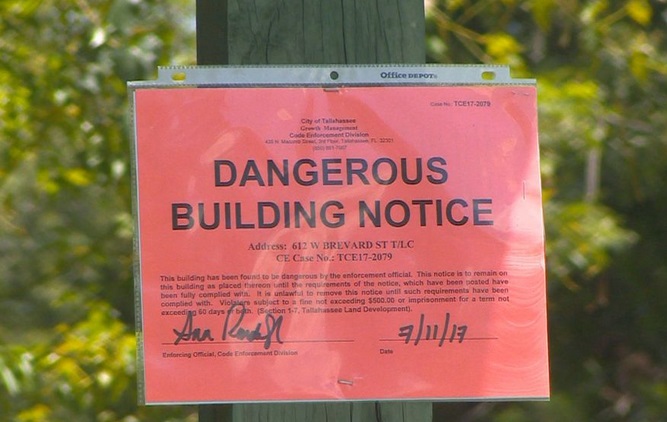At the City Commission meeting on Oct. 28, the Commissioners voted to approve the implementation of a pilot Code Enforcement and Lien Amnesty Program that is looking to forgive $700,000 worth of lingering code violations and also help revitalize neighborhoods. The program was proposed by the Housing and Community Resilience Department (HCR).
The HCR ensures that properties in the City of Tallahassee meet all health and public safety requirements. The department works to improve citizens’ quality of life by having goals that keep in mind the impact of poverty, especially right now during the COVID-19 pandemic.
The Amnesty Program aims to help applicants with cases with outstanding fines and significant backlogs of cases by providing financial assistance, giving many property owners a clean slate.
“The Amnesty Program is designed to provide financial relief and potential economic stimulus that can prompt property owners to address lingering code violations and join their neighborhoods’ revitalization efforts,” staff reports.
Many code violations come from properties that are vacant, abandoned or otherwise deemed unsafe to be maintained. Staff reports that code violations have a negative economic and social impact.
The Amnesty Program will allow for fine forgiveness between $50 and $350 excluding administrative costs. The program will be offered during a limited period of time at the beginning of 2021 for a three-month period and will be available to property owners with active code enforcement cases that were set in place prior to this past June. All rulings after this program ends will be enforced by an enhanced process.


Sometimes there needs to be consequences for actions and inactions.
I believe there are circumstances that warrant compassion and forgiveness, but an across-the-board amnesty?
Why not consider it on a case-by-case basis and set up boundaries and rules for forgiveness of fines so it doesn’t turn into an arbitrary system?
Standard Democrat Government Operation…
* Goal: The improper allocation of taxpayer dollars to code violators and deadbeat property owners in order to buy votes
* Problem: Code violators and deadbeat property owners have code violations, fines, and “liens” attached to their property… thus preventing the improper transfer of taxpayers’ funds
* Solution: Ignore the code violations, waive fines, remove liens… and spend away
* Moral of the story: “Votes Matter; Laws Don’t”
A regulation without penalty is nothing more than a sign of weakness. If your neighbor piles old furniture, dead cars and other junk in their yard and their is no consequence, forgiving their fine will only reinforce the idea that the rule didn’t matter in the first place. My home would be worth a million dollars if my neighbors complied with local zoning rules and if the school system didn’t suck. Another example, must wear a “weakness” face mask but if you don’t that is okay, too. Our local commissioners are the big winners….getting rich by taxing the crap out of everyone.
Am I reading this correctly? The city wants to forgive 2000 code violations ($700,000 total divided by max $350 fine) and suddenly these “lingering” code violations will disappear and those properties that are vacant, abandoned or heretofore deemed unsafe will miraculously revitalize the community.. So it’s the fines the city has levied on the property owner that is causing bad neighborhoods and a low quality of life for the residents. Glad we got that straightened out but tell me again, exactly why do we have a code?